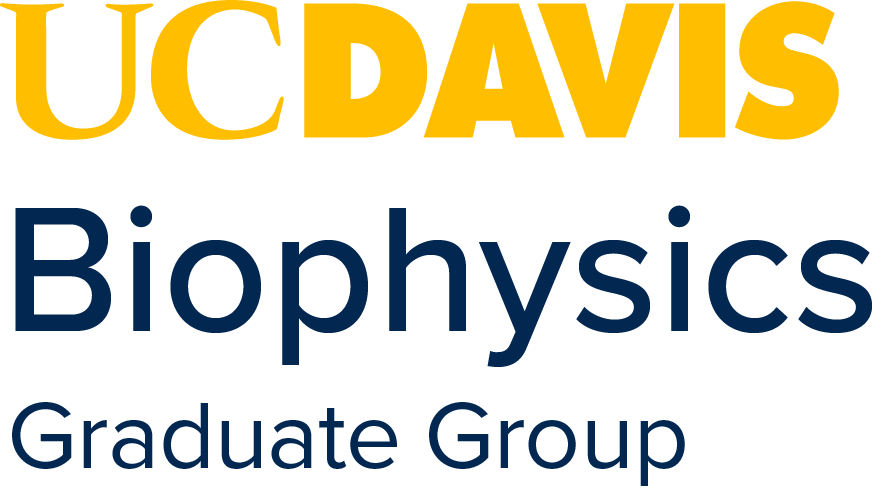Core Coursework
These are the courses taken by all Biophysics Ph.D. students in their first year. All core courses must be completed with a grade of B- or better.
- BCB 211, Macromolecular Structure and Interactions (fall): Conceptual and quantitative basis for macromolecular structure-function relationships. Investigation of the paradigm form follows function. Review of key elements of protein, nucleic acid, and membrane structure. Exploration of specific macromolecular associations by analyzing chemical structure and physical-chemical behavior.
- BPH 200LB, Laboratory Rotations Course (fall and winter): Two five-week laboratory assignments in the research laboratories of Biophysics Graduate Group faculty members. Individual research problems with emphasis on methodological/procedural experience and experimental design.
- BPH 293, Meet the Faculty (fall): Presentation of current research activities of the Biophysics Graduate Group faculty. Facilitation of students in developing their research interest, and promoting collegial interactions.
- BPH 290, Navigating Graduate School (fall): This professional development seminar is conducted by the BPH Graduate Group's lead academic advisor.
- BPH 200A, Current Techniques in Biophysics (winter): Topics include mathematical methods, modeling, mass spectrometry, stochastic process, scanning probe microscopy, electron microscopy, fluorescence, membrane diffusion/mechanics, and single particle tracking.
- BPH 200B, Current Techniques in Biophysics (spring): Topics include protein folding, membrane structure and dynamics, Raman spectroscopy, fluorescence resonance energy transfer, time resolved fluorescence, quantum dot, fluorescence imaging, ESR, high resolution NMR, and in vivo NMR.
- BPH 241, Membrane Biology (spring): Advanced topics on membrane biochemistry and biophysics. Relationship of the unique properties of biomembranes to their roles in cell biology and physiology.
- BPH 290, Biophysics Seminar (first two years): This satisfactory/unsatisfactory course credit indicates attendance at the graduate group seminar series.
Statistics Coursework
A minimum 4 units of upper-division or graduate-level statistics coursework must be completed with a grade of B- or better. Examples include:
- STA 100: Applied Statistics for Biological Sciences (4 units)
- STA 130A: Mathematical Statistics Brief Course (4 units)
- STA 131A: Introduction to Probability Theory (upper-division undergraduate level; 4 units)
- STA 200A: Introduction to Probability Theory (graduate level; 4 units)
- STA 200B: Introduction to Mathematical Statistics (4 units)
- STA 206: Statistical Methods for Research 1 (4 units)
- STA 207: Statistical Methods for Research 2 (4 units)
- PLS 205: Experimental Design and Analysis (5 units)
- EBS 265: Design and Analysis of Engineering Experiments (5 units)
- BIM 283: Advanced Design of Experiments for Biomedical Engineers (4 units)
- CLH 244: Introduction to Medical Statistics (4 units)
Scientific Integrity Coursework
This degree requirement can be completed in one of two ways:
- GGG 296, Scientific Professionalism & Integrity: This one-unit course is a requirement for all NIH T32 trainees.
- UC Davis Responsible Conduct of Research: This certificate series sponsored by the Office of Research is completed entirely online; attendance at some Zoom sessions is required.
Elective Coursework
Students must complete three additional graduate-level courses (9 units total) in their area of specialization. A list of recommended electives follows; electives not on this list may be approved on a case-by-case basis by the student's graduate academic advisor.
Specialization in Molecular and Cellular Biophysics:
- BPH 271: Optical Methods in Biophysics (4 units)
- BPH 288: Living Matter: Physical Biology of the Cell (3 units)
- BCB 212: Cell Biology (3 units)
- BCB 214: Molecular Biology (3 units)
- BIM 202: Cell & Molecular Biology for Engineers (4 units)
- BIM 262: Cell and Molecular Biophysics for Bioengineers (4 units)
- ECH 254: Colloid & Surface Phenomena (4 units)
- ECH 265: Emulsions, Microemulsions & Bilayers (3 units)
- PTX 215: Electrophysiology techniques and applications (3 units)
- MCP 210A: Advanced Physiology (5 units)
Specialization in Structural Biophysics:
- BIM 252: Computational Methods in Biomedical Imaging (4 units)
- BPH 271: Optical Methods in Biophysics (4 units)
- CHE 218: Macromolecules: Physical Principles (3 units)
- CHE 210C: Quantum Chemistry: Molecular Spectroscopy (3 units)
- CHE 216: NMR (3 units)
- CHE 217: X-ray Structure Determination (3 units)
- CHE 241E/BPH 255: Nanotechnology and Imaging (3 units)
- CHE 241B: Laser & X-ray Spectroscopy (3 units)
- CHE 233: Physical-Organic Chemistry (3 units)
- PHA 207: Drug Discovery & Development (3 units)
Specialization in Computational Biophysics:
- MAE 216: Advanced Thermodynamics (4 units)
- BIM 254: Statistical Methods in Genomics (4 units)
- ECH 261: Molecular Modelling of Soft & Biological Matter (4 units
- ECS 124: Theory & Practice of Bioinformatics (4 units)*
- ECS 129: Computational Structural Bioinformatics (4 units)*
- ECS 221: Computational Methods in Systems & Synthetic Biology (4 units)
- ECS 229: Advanced Computational Structural Bioinformatics (4 units)
- CHE 245: Mechanistic Enzymology (3 units)
- HPH/PHA 234: Advances in Computational Physics and Pharmacology (2 units)
- STA 243: Computational Statistics (4 units)
* This undergraduate-level course has been approved as an exception to the rule that electives must be graduate-level courses.
